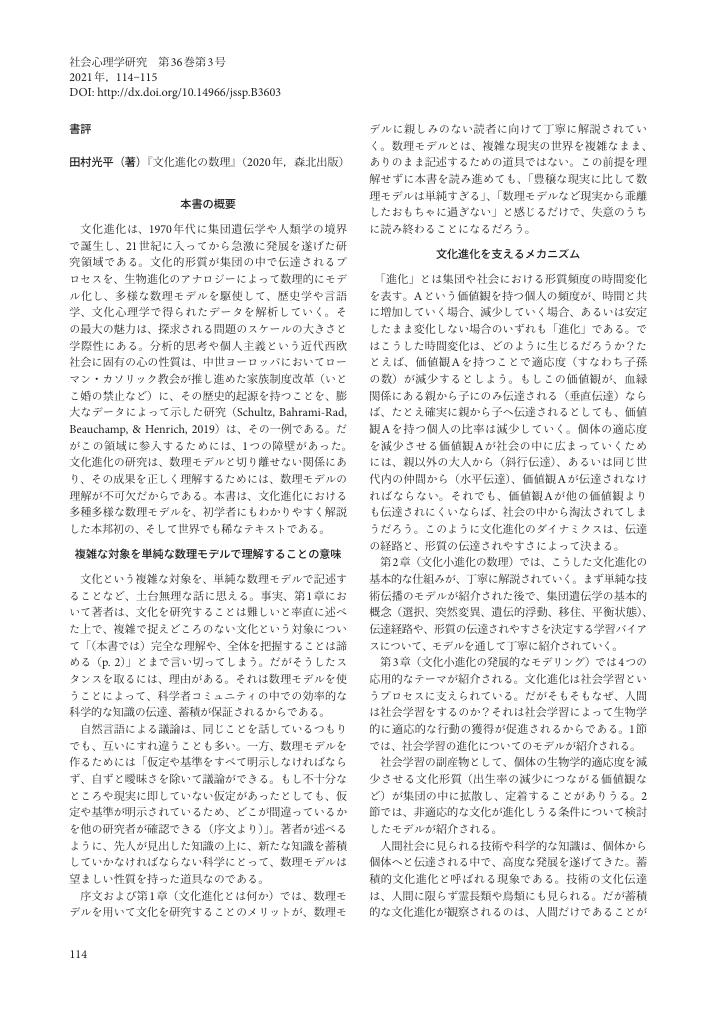8 0 0 0 OA 心理学におけるモデリングの必要性
- 著者
- 竹澤 正哲
- 出版者
- 心理学評論刊行会
- 雑誌
- 心理学評論 (ISSN:03861058)
- 巻号頁・発行日
- vol.61, no.1, pp.42-54, 2018 (Released:2019-07-11)
- 参考文献数
- 35
- 被引用文献数
- 8
In the last decade, psychology faced a serious crisis, called the reproducibility problem. To solve the problem, several methodological and institutional changes have been proposed and implemented such as the promotion of replication studies and publication of negative results, the introduction of a preregistration system in academic journals, and the implementation of novel statistical methods for suppressing false-positive results. In this paper, based on a previously proposed formal model of population dynamics of scientific discovery, I first explain that these changes are insufficient for avoiding the reproducibility problem. Based on two examples in social psychology, I also discuss that what is necessary for fundamental reformulation of psychology is rigorous modeling, which has already been widely applied in many scientific fields outside psychology.
5 0 0 0 コミュニケーションと文化伝達による語順規則の創発
- 著者
- .*中田 星矢 大平 朱莉 竹澤 正哲
- 雑誌
- 日本心理学会第87回大会
- 巻号頁・発行日
- 2023-08-03
5 0 0 0 OA 田村光平(著)『文化進化の数理』(2020年,森北出版)
- 著者
- 竹澤 正哲
- 出版者
- 日本社会心理学会
- 雑誌
- 社会心理学研究 (ISSN:09161503)
- 巻号頁・発行日
- vol.36, no.3, pp.114-115, 2021-03-31 (Released:2021-03-31)
- 参考文献数
- 2
3 0 0 0 OA 心的状態の推測方略:投影とステレオタイプ化
- 著者
- 石井 辰典 竹澤 正哲
- 出版者
- 日本社会心理学会
- 雑誌
- 社会心理学研究 (ISSN:09161503)
- 巻号頁・発行日
- pp.0941, (Released:2017-02-10)
- 参考文献数
- 24
It has been argued that people selectively use two strategies, projection and stereotyping, to infer the mental state of others. Through a series of studies, Ames (2004) confirmed the hypothesis that people project their own mental state to the other when the target person is perceived to be similar to oneself, while the stereotype of a group or category to which the target person belongs is used for mental state inferences when the target is perceived to be dissimilar. Four replication studies of Ames (2004), however, consistently provided counterevidence against this hypothesis. Participants employed projection consistently, regardless of the perceived similarity to the target person. This result suggests that further examination of conditions that trigger different mental state inference strategies is needed.
2 0 0 0 OA 社会的規範の維持と変化を説明する:進化社会科学における未解決の問い
- 著者
- 竹澤 正哲
- 出版者
- 一般社団法人 人工知能学会
- 雑誌
- 人工知能 (ISSN:21882266)
- 巻号頁・発行日
- vol.34, no.2, pp.168-175, 2019-03-01 (Released:2020-09-29)
1 0 0 0 OA 所有と分配 : 共同分配規範の社会的発生基盤に関する進化ゲーム分析
- 著者
- 竹澤 正哲 亀田 達也
- 出版者
- 日本認知科学会
- 雑誌
- 認知科学 (ISSN:13417924)
- 巻号頁・発行日
- vol.6, no.2, pp.191-205, 1999-06-01 (Released:2008-10-03)
- 参考文献数
- 26
- 被引用文献数
- 3
How does a reciprocal communal sharing system come into existence in a sustainable form in human societies? The anthropological literature has provided two explanations for the origin of communal sharing under uncertainty: risk reduction by social sharing (Kaplan & Hill, 1985) and tolerated theft (Blurton Jones, 1984, 1987; Winterhalder, 1986, 1996). In this paper, we aim to develop a third explanation focusing on the emergence of a communal sharing norm. A communal sharing norm here refers to a social norm designating uncertain resources as common properties. A series of computer simulations based on an evolutionary game framework suggests that such a communal sharing norm is indeed evolvable. We argue that the evolutionary game analysis can be a powerful tool in cognitive science to derive empirical hypotheses concerning various cognitive and behavioral mechanisms.
1 0 0 0 IR 楽観性が随伴性認知の正確さに与える影響 : 抑うつリアリズムの観点から
- 著者
- 伊澤 冬子 竹澤 正哲
- 出版者
- 上智大学総合人間科学部心理学科
- 雑誌
- 上智大学心理学年報 (ISSN:0387849X)
- 巻号頁・発行日
- vol.37, pp.49-61, 2013

